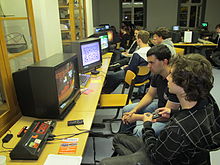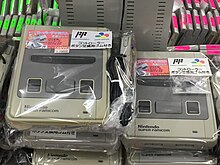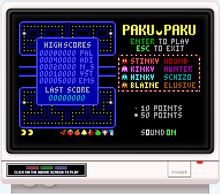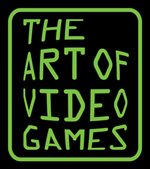
The Super Nintendo Entertainment System, commonly shortened to Super Nintendo, Super NES or SNES, is a 16-bit home video game console developed by Nintendo that was released in 1990 in Japan and South Korea, 1991 in North America, 1992 in Europe and Oceania and 1993 in South America. In Japan, it is called the Super Famicom (SFC). In South Korea, it is called the Super Comboy and was distributed by Hyundai Electronics. The system was released in Brazil on August 30, 1993, by Playtronic. In Russia and CIS, the system was distributed by Steepler from 1994 until 1996. Although each version is essentially the same, several forms of regional lockout prevent cartridges for one version from being used in other versions.

A video game console is an electronic device that outputs a video signal or image to display a video game that can typically be played with a game controller. These may be home consoles, which are generally placed in a permanent location connected to a television or other display devices and controlled with a separate game controller, or handheld consoles, which include their own display unit and controller functions built into the unit and which can be played anywhere. Hybrid consoles combine elements of both home and handheld consoles.

MAME is a free and open-source emulator designed to recreate the hardware of arcade games, video game consoles, old computers and other systems in software on modern personal computers and other platforms. Its intention is to preserve gaming history by preventing vintage video games from being lost or forgotten. It does this by emulating the inner workings of the emulated machines; the ability to actually play the video games is considered "a nice side effect". Joystiq has listed MAME as an application that every Windows and Mac gamer should have.
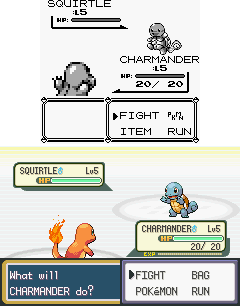
A video game remake is a video game closely adapted from an earlier title, usually for the purpose of modernizing a game with updated graphics for newer hardware and gameplay for contemporary audiences. Typically, a remake of such game software shares essentially the same title, fundamental gameplay concepts, and core story elements of the original game, although some aspects of the original game may have been changed for the remake.

Retrocomputing is the current use of older computer hardware and software. Retrocomputing is usually classed as a hobby and recreation rather than a practical application of technology; enthusiasts often collect rare and valuable hardware and software for sentimental reasons.

A ROM image, or ROM file, is a computer file which contains a copy of the data from a read-only memory chip, often from a video game cartridge, or used to contain a computer's firmware, or from an arcade game's main board. The term is frequently used in the context of emulation, whereby older games or firmware are copied to ROM files on modern computers and can, using a piece of software known as an emulator, be run on a different device than which they were designed for. ROM burners are used to copy ROM images to hardware, such as ROM cartridges, or ROM chips, for debugging and QA testing.

The Sega Genesis, known as the Mega Drive outside North America, is a 16-bit fourth generation home video game console developed and sold by Sega. It was Sega's third console and the successor to the Master System. Sega released it in 1988 in Japan as the Mega Drive, and in 1989 in North America as the Genesis. In 1990, it was distributed as the Mega Drive by Virgin Mastertronic in Europe, Ozisoft in Australasia, and Tectoy in Brazil. In South Korea, it was distributed by Samsung Electronics as the Super Gam*Boy and later the Super Aladdin Boy.
In video gaming parlance, a conversion is the production of a game on one computer or console that was originally written for another system. Over the years, video game conversion has taken form in a number of different ways, both in their style and the method in which they were converted.

A video game console emulator is a type of emulator that allows a computing device to emulate a video game console's hardware and play its games on the emulating platform. More often than not, emulators carry additional features that surpass limitations of the original hardware, such as broader controller compatibility, timescale control, easier access to memory modifications, and unlocking of gameplay features. Emulators are also a useful tool in the development process of homebrew demos and the creation of new games for older, discontinued, or rare consoles.

In computing, an emulator is hardware or software that enables one computer system to behave like another computer system. An emulator typically enables the host system to run software or use peripheral devices designed for the guest system. Emulation refers to the ability of a computer program in an electronic device to emulate another program or device.

The GP2X Caanoo, more commonly known as Caanoo, stylized CAANOO, is an open source, Linux-based handheld video game console and portable media player developed by the South Korean company GamePark Holdings. It was released on August 16, 2010 in South Korea and was also sold throughout Europe. It is the successor to the GP2X Wiz, and was showcased at the Electronic Entertainment Expo 2010. The device's launch price was about US$150, but did not reach any retail stores in North America.
RetroN is a series of video game consoles created and developed by Hyperkin which allows users to play video games from consoles such as the Nintendo Entertainment System and the Super NES. Since the release of the RetroN 5, they have been connected via HDMI. The latest in the series, RetroN Sq, was released in 2021.

Super Potato is a Japanese video game store known for its collection of retrogames.
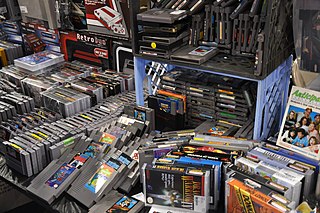
Video game preservation is a form of preservation applied to the video game industry that includes, but is not limited to, digital preservation. Such preservation efforts include archiving development source code and art assets, digital copies of video games, emulation of video game hardware, maintenance and preservation of specialized video game hardware such as arcade games and video game consoles, and digitization of print video game magazines and books prior to the Digital Revolution.

Hyperkin is an American video game peripheral manufacturer and distributor, founded in 2006, based in Los Angeles, California. They distribute accessories for major gaming consoles, in addition to creating clone consoles that play retro games with modern resolutions and on modern devices, most notably the RetroN series of clone consoles. As with most other NES clones, Hyperkin's NES clones suffer from imperfect sound due to a design flaw in the sound hardware.

The Evercade is a handheld game console developed and manufactured by British company Blaze Entertainment. It focuses on retrogaming with ROM cartridges that each contain a number of emulated games. Evercade was released in May 2020 and upon its launch offered 10 game cartridges with a combined total of 122 games.
The Anbernic RG351 is a Linux-based handheld game console created in China by Anbernic. The console uses a microSD card for storage and is a digital ROM-only console. It is the successor to the RG350, and has emerged as a prominent handheld console for retrogaming alongside the Retroid Pocket 2, with the screen aspect ratio of some models particularly optimized for Game Boy Advance titles. It is sold in several models with different shells and screen resolutions, but similar internal specifications. Critics have praised its quality and functionality, but criticized certain aspects of its design.
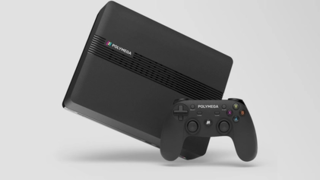
Polymega is a home video game console developed by American company Playmaji, Inc. It is a retro gaming console offering backwards compatibility with several CD-based and cartridge-based platforms: PlayStation, TurboGrafx-CD, Neo Geo CD, Sega CD, Sega Saturn, Nintendo Entertainment System (NES), Sega Genesis, Sega 32X, Super Nintendo Entertainment System (SNES), and Nintendo 64. It includes a built-in CD drive, while separate add-ons known as Element Modules provide support for cartridge-based games.
Anbernic is a Chinese handheld gaming console company founded in 2017 in Shenzhen by Shenzhen YangLiMing Electronic Technology Co.

